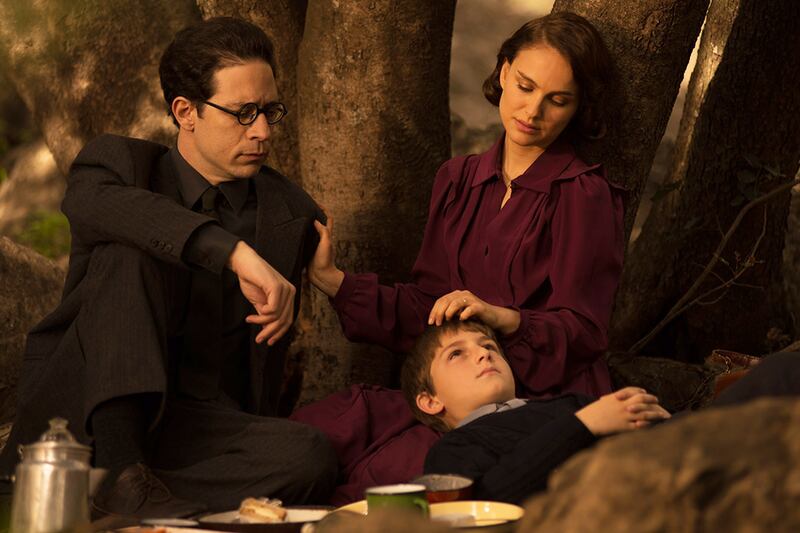Love, darkness, moodiness, and grim solemnity mark and mar the directorial debut of Oscar-winning actress Natalie Portman, who spent a decade chasing her ambitious dream project adapted from Israeli author Amos Oz’s memoirs. But while A Tale of Love and Darkness is the textbook definition of a noble effort—one that’s promising for Portman’s future behind the camera, if nothing else—it’s a challenging watch for those with short attention spans and no patience for the kind of opaque, languidly paced, labored storytelling most moviegoers avoid if they can help it.
Chalk some of that up to the pressures someone like Portman must have faced in even getting this film off the ground. A $4 million budget would be absurdly luxurious to just any first-time indie director whose best-case debut might play a festival, score distribution, and open in a handful of theaters. But for a leading Hollywood A-lister making a prestige passion picture laden with personal import, a project like A Tale of Love and Darkness is a loaded litmus test for any serious designs on a career behind the camera.
To that end, Portman’s debut both defiantly succeeds and falters, even if Portman deserves to walk away with more respect earned than lost. The 35-year-old filmmaker wrote, directed, and stars in the film adapted from Oz’s 2002 memoirs of growing up as a young boy in Jerusalem, the son of a frustrated scholar (Gilad Kahana) and a tormented Eastern European Holocaust survivor (Portman), as idealistic hope gave way to violent tumult during the creation of the State of Israel. Its moody melancholy builds in the fragments of a man piecing together the past through the incomplete observations of his younger self, and as Portman dives into Oz’s journey and that of the turbulent geopolitical forces around him, the film rings with obvious reverence.
But Portman ironically loses focus, and tests viewers’ patience, by relying on the one element the film needs less of: her. Like the book, the film is told through the eyes of Oz himself, who’s first introduced onscreen as an older man searching the storied corners of Jerusalem’s Old City for clues, issuing grave voice-over musings like, “Jerusalem is a black widow… who devours her lovers while they are still inside her.” Haunted by the death of his mother Fania at the age of 38, his memories of her play out in vivid recollections, fixated on how his formative years were shaped by the woman whose spark would slowly, heartachingly, fade from the emotional battery of living through intense trauma and reckoning with her own deflated hopes.
The fact that Portman the director lavishes too much attention on Portman the actor is both blessing and curse, in what’s not the typical kind of self-directed vehicle that used to be more widely denigrated as a vanity project in Tinseltown. A Tale of Love and Darkness isn’t just set in a stoic, relatively unsexy, post-WWII Jerusalem; it was also filmed entirely in Hebrew, which viewers will either take as admirable authenticity or direct challenge. So while Portman’s empathetic performance is exquisitely modulated indeed, there is a vanity to this undertaking at large, one of serious art-making—a pretense underscored by the moody desaturated blues and greens Portman shoots in, the floridly poetic dialogue with which characters communicate, and her occasional overly-intentioned film school lyricism.
Like Angelina Jolie last year with By the Sea, Portman places herself in the line of critical fire with her penchant for heavy-handed scenarios. Both films, coincidentally, feature scenes in which the actor-directors are discovered soaked head to toe by the elements to represent the deep, mournful expression of feelings their emotionally bereft characters can’t express. In Tales, this amounts to Portman’s Fania sitting despondent outside in a rainstorm. Elsewhere, she sits despondent in her bedroom. Later, she sits despondent in a restaurant. One imagines Portman had to place herself so front-and-center in order to secure the financing to make the damn thing in the first place, too, but it’s a shame that in doing so she undermines the most intriguing perspective: that of the studiously observant young Oz (Amir Tessler), who’s forced to watch his depressive mother stare into the distance for far too many scenes, and we along with him.

The real Oz grew up surrounded and shaped by Israel’s academic elite, but Tales focuses on the closeness he shared with Fania. Theirs is a loving bond forged through storytelling as she relates fables drawn from her own youth, corralling silent traumas that still haunt her into pained silences and fleeting glances hidden in her face. Portman spins these philosophical lessons into their own fantastical scenes, constructing a vibrant interior life for Oz as he processes the oblique darkness in his mother’s careful teachings. There’s a lovely simplicity to how that core relationship mirrors Oz’s own understanding of the political conflict he’s growing up within: a divided society he’s acutely aware of as the philosophies of his parents trickle down to his playground interactions and develop into action as he happily joins wartime efforts foraging for empty bottles to turn into Molotov cocktails.
Oz’s struggle to understand his doomed mother is also his struggle to understand his homeland. Israeli-born Portman addresses that omnipresent and still-complex topic with delicacy and relative distance, letting Oz’s words voice their collective disillusionment. Israel and Palestine, Tales laments, are “two children of the same abusive father.” The underlying sentiment is a mournful revelation that once a dream is fulfilled, it can no longer live up to the perfect potential one once envisioned for it—a rearview-mirror truism that applies to parents, political utopias, and all artistic endeavors.






